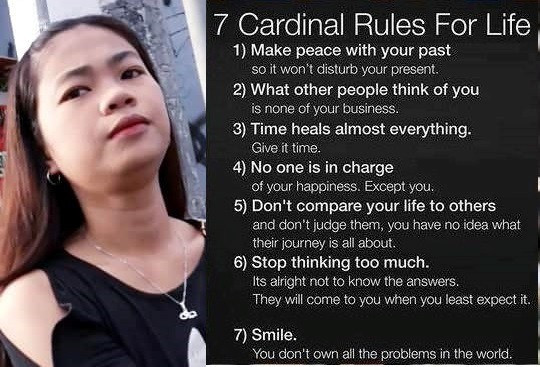---------------------------------------------------------------------------------------------------
GLOBAL INTELLIGENCE BRIEFING FOR CEO's
-points to ponder...Sunday, January 25, 2009 7:49 PM
On Sat, Jan 24, 2009 at 11:11 PM, Duncan Idaho
<duncanidaho. boom@gmail . com> wrote:
GLOBAL INTELLIGENCE BRIEFING FOR CEO's
by HERBERT MEYER
Currently, four major transformations are shaping political,
economic and world events and have profound implications for
American business and culture and thus for our way of life.
1. The War in Iraq
There are three major monotheistic religions in the world:
Christianity, Judaism and Islam. In the 16th century, Judaism and
Christianity reconciled with the modern world. The rabbis, priests and
scholars found a way to settle up and pave the way forward. Religion
remained at the center of life, but church and state became separate.
Rule of law, idea of economic liberty, individual rights, human Rights
-- all these are defining points of modern Western civilization. These
concepts started with the Greeks but didn't take off until the 15th
and 16th century when Judaism and Christianity found a way to
reconcile with the modern world. When that happened, it unleashed the
scientific revolution and the greatest outpouring of art, literature
and music the world has ever known.
Islam, which developed in the 7th century, counts millions of
Muslims around the world who are normal people. However, there is a
radical streak within Islam. When the radicals are in charge, Islam
attacks Western civilization. Islam first attacked Western
civilization in the 7th century, and later in the 16th and 17th
centuries. By 1683, the Muslims (Turks from the Ottoman Empire)
were literally at the gates of Vienna. It was in
Vienna that the climactic battle between Islam and Western
civilization took place. The West won and went forward. Islam lost
and went backward. Interestingly, the date of that battle was
September 11. Since then, Islam has not found a way to reconcile with
the modern world.
Today, terrorism is the third attack on Western civilization by
radical Islam. To deal with terrorism, the U.S. is doing two things.
First, units of our armed forces are in 30 countries around the world
hunting down terrorist groups and dealing with them. This gets very
little publicity. Second we are taking military action in Afghanistan
and Iraq. These actions are covered relentlessly by the media.
People can argue about whether the war in Iraq is right or wrong.
However, the underlying strategy behind the war is to use our military
to remove the radicals from power and give the moderates a chance.
Our hope is that, over time, the moderates will find a way to bring Islam
forward into the 21st century. That's what our involvement in Iraq and
Afghanistan is all about.
The lesson of 9/11 is that we live in a world where a small number
of people can kill a large number of people very quickly. They can use
airplanes, bombs, anthrax, chemical weapons or dirty bombs. Even with
a first-rate intelligence service (which the U.S. does not have), you
can't stop every attack. That means our tolerance for political
horseplay has dropped to zero. No longer will we play games with
terrorists or weapons of mass destructions. Most of the instability
and horseplay is coming from the Middle East.
That's why we have thought that if we could knock out the radicals
and give the moderates a chance to hold power, they might find a way
to reconcile Islam with the modern world. So when looking at
Afghanistan or Iraq , it's important to look for any signs that they
are modernizing. For example, women being brought into the work force
and colleges in Afghanistan is good.
The Iraqis stumbling toward a constitution is good.
People can argue about what the U.S. is doing and how we're
doing it, but anything that suggests Islam is finding its way forward
is good.
2. The Emergence of China
In the last 20 years, China has moved 250 million people from the farms
and villages intothe cities. Their plan is to move another 300 million
in thenext 20years. When you put that many people into the cities,
you have to find work for them.
That's why China is addicted to manufacturing; they
have to put all the relocated people to work. When we decide to
manufacture something in the U.S., it's based on market needs and the
opportunity to make a profit. In China, they make the decision because
they want the jobs, which is a very different calculation.
While China is addicted to manufacturing, Americans are addicted
to low prices. As a result, a unique kind of economic codependency has
developed between the two countries. If we ever stop buying from
China, they will explode politically. If China stops selling to us,
our economy will take a huge hit because prices will jump. We are
subsidizing their economic development; they are subsidizing our
economic growth. Because of their huge growth in manufacturing,
China is hungry for raw materials, which drives prices up worldwide.
China is also thirsty for oil, which is one reason oil prices are rising.
By 2020, China will produce more cars than the U.S.
China is also buying its way into the oil infrastructure around the world.
They are doing it in the open market and paying fair market prices, but
millions of barrels of oil that would have gone to the U.S. are now going to China.
China's quest to assure it has the oil it needs to fuel its economy is
a major factor in world politics and economics.
We have our Navy fleets protecting the sea lines, specifically the
ability to get the tankers through. It won't be long before the
Chinese have an aircraft carrier sitting in the Persian Gulf as well.
The question is, will their aircraft carrier be pointing in the same
direction as ours or against us?
3. Shifting Demographics of Western Civilization
Most countries in the Western world have stopped breeding. For a
civilization obsessed with sex, this is remarkable. Maintaining a
steady population requires a birth rate of 2.1 in
Western Europe , the birth rate currently stands at 1.5, or 30 percent
below replacement. In 30 years there will be 70 to 80 million fewer
Europeans than there are today. The current birth rate in Germany is
1.3. Italy and Spain are even lower at 1.2. At that rate, the working
age population declines by 30 percent in 20 years, which has a huge
impact on the economy. When you don't have young workers to replace
the older ones, you have to import them.
The European countries are currently importing Muslims. Today, the
Muslims comprise 10 percent of France and Germany, and the
percentage is rising rapidly because they have higher birthrates.
However, the Muslim populations are not being integrated into the
cultures of their host countries, which is a political catastrophe.
One reason Germany and France don't support the Iraq war is they fear
their Muslim populations will explode on them. By 2020, more than half
of all births in the Netherlands will be non-European.
The huge design flaw in the postmodern secular state is that you
need a traditional religious society birth rate to sustain it. The
Europeans simply don't wish to have children, so they are dying. In
Japan, the birthrate is 1.3. As a result, Japan will lose up to 60
million people over the next 30 years. Because Japan has a very
different society than Europe, they refuse to import workers. Instead,
they are just shutting down. Japan has already closed 2,000 schools,
and is closing them down at the rate of 300 per year. Japan is also
aging very rapidly. By 2020, one out of every five Japanese will be
at least 70 years old. Nobody has any idea about how to run an
economy with those demographics.
Europe and Japan, which comprise two of the world's major economic
engines, aren't merely in recession, they're shutting down. This will
have a huge impact on the world economy, and it is already beginning
to happen. Why are the birthrates so low? There is a direct
correlation between abandonment of traditional religious society and a
drop in birth rate, and Christianity in Europe is becoming irrelevant.
The second reason is economic. When the birth rate drops below
replacement, the population ages. With fewer working people to support
more retired people, it puts a crushing tax burden on the smaller
group of working age people. As a result, young people delay marriage
and having a family. Once this trend starts, the downward spiral only
gets worse. These countries have abandoned all the traditions they
formerly held in regard to having families and raising children.
The U.S. birth rate is 2.0, just below replacement. We have an
increase in population because of immigration. When broken down by
ethnicity, the Anglo birth rate is 1.6 (same as France) while the
Hispanic birth rate is 2.7. In the U.S., the baby boomers are
starting to retire in massive numbers. This will push the elder
dependency ratio from 19 to 38 over the next 10 to 15 years. This is
not as bad as Europe, but still represents the same kind of trend.
Western civilization seems to have forgotten what every primitive
society under-stands -- you need kids to have a healthy society.
Children are huge consumers. Then they grow up to become tax payers.
That's how a society works, but the postmodern secular state seems to
have forgotten that. If U.S. birth rates of the past 20 to 30 years
had been the same as post-World War II, there would be no Social
Security or Medicare problems.
The world's most effective birth control device is money.
As society creates a middle class and women move into the workforce,
birth rates drop. Having large families is incompatible with middle
class living. The quickest way to drop the birth rate is through rapid
economic development. After World War II, the U.S. instituted a $600
tax credit per child. The idea was to enable mom and dad to have four
children without being troubled by taxes. This led to a baby boom of
22 million kids, which was a huge consumer market. That turned into a
huge tax base. However, to match that incentive in today's dollars
would cost $12,000 per child.
China and India do not have declining populations. However, in
both countries, there is a preference for boys over girls, and we now
have the technology to know which is which before they are born. In
China and India, families are aborting the girls. As a result, in each
of these countries there are 70 million boys growing up who will never
find wives. When left alone, nature produces 103 boys for every 100
girls. In some provinces, however, the ratio is 128 boys to every 100
girls. [I have read that this creates a potentially explosive
situation. You have to keep all these potential sources of political
instability contented. One way, historically often used, is war.]
The birth rate in Russia is so low that by 2050 their population
will be smaller than that of Yemen . Russia has one-sixth of the
earth's land surface and much of its oil. You can't control that much
area with such a small population. Immediately to the south, you have
China with 70 million unmarried men who are a real potential nightmare
scenario for Russia. [See my comment above.]
4. Restructuring of American Business
The fourth major transformation involves a fundamental
restructuring of American business. Today's business environment is
very complex and competitive. To succeed, you have to be the best,
which means having the highest quality and lowest cost. Whatever your
price point, you must have the best quality and lowest price. To be
the best, you have to concentrate on one thing. You can't be all
things to all people and be the best.
A generation ago, IBM used to make every part of their computer.
Now Intel makes the chips, Microsoft makes the software, and someone
else makes the modems, hard drives, monitors, etc. IBM even out
sources their call center. Because IBM has all these companies
supplying goods and services cheaper and better than they could do it
themselves, they can make a better computer at a lower cost. This is
called a fracturing of business. When one company can make a better
product by relying on others to perform functions the business used to
do itself, it creates a complex pyramid of companies that serve and
support each other.
This fracturing of American business is now in its second generation.
The companies who supply IBM are now doing the same thing
- outsourcing many of their core services and production process. As
a result, they can make cheaper, better products. Over time, this
pyramid continues to get bigger and bigger. Just when you think it
can't fracture again, it does. (China outsources some tasks where a
nation provides cheaper labor; e.g. Viet Nam.)
Even very small businesses can have a large pyramid of corporate
entities that perform many of its important functions. One aspect of
this trend is that companies end up with fewer employees and more
independent contractors. This trend has also created two new words in
business, integrator and complementor. At the top of the pyramid, IBM
is the integrator. As you go down the pyramid, Microsoft, Intel and
the other companies that support IBM are the complementors. However,
each of the complementors is itself an integrator for the
complementors underneath it.
This has several implications, the first of which is that we are
now getting false readings on the economy. People who used to be
employees are now independent contractors launching their own
businesses. There are many people working whose work is not listed as
a job. As a result, the economy is perking along better than the
numbers are telling us. (This mix doesn't help IRS collect taxes, either.)
Outsourcing also confused the numbers. Suppose a company like
General Motors decides to outsource all its employee cafeteria
functions to Marriott (which it did). It lays off hundreds of
cafeteria workers, who then get hired right back by Marriott. The only
thing that has changed is that these people work for Marriott rather
than GM. Yet, the media headlines will scream that America has lost
more manufacturing jobs.
All that really happened is that these workers are now
reclassified as service workers. So the old way of counting jobs
contributes to false economic readings. As yet, we haven't figured out
how to make the numbers catch up with the changing realities of the
business world.
Another implication of this massive restructuring is that because
companies are getting rid of units and people that used to work for
them, the entity is smaller. As the companies get smaller and more
efficient, revenues are going down but profits are going up. As a
result, the old notion that revenues are up and we're doing great
isn't always the case anymore. Companies are getting smaller but are
becoming more efficient and profitable in the process.
IMPLICATIONS OF THE FOUR TRANSFORMATIONS
1. The War in Iraq
In some ways, the war is going very well. Afghanistan and Iraq
have the beginnings of a modern government, which is a huge step
forward. The Saudis are starting to talk about some good things, while
Egypt and Lebanon are beginning to move in a good direction. A series
of revolutions have taken place in countries like Ukraine and
Georgia.
There will be more of these revolutions for an interesting reason.
In every revolution, there comes a point where the dictator turns to
the general and says, Fire into the crowd. If the general fires into
the crowd, it stops the revolution. If the general says No, the
revolution continues. Increasingly, the generals are saying No because
their kids are in the crowd.
Thanks to TV and the Internet, the average 18-year old outside the
U.S. is very savvy about what is going on in the world, especially in
terms of popular culture. There is a huge global consciousness, and
young people around the world want to be a part of it. It is
increasingly apparent to them that the miserable government where they
live is the only thing standing in their way. More and more, it is the
well-educated kids, the children of the generals and the elite, who
are leading the revolutions.
At the same time, not all is well with the war. Violence in Iraq
is worse and doesn't appear to be improving. We may be asking too
much of Islam all at one time. We're trying to jolt them from the 7th
century to the 21st century all at once, which may be further than
they can go. They might make it and they might not. Nobody knows for
sure. The point is, we don't know how the war will turn out. Anyone
who says they know is just guessing.
The real place to watch is Iran. If they actually obtain nuclear
weapons it will be a terrible situation. There are two ways to deal
with it. The first is a military strike, which will be very difficult.
The Iranians have dispersed their nuclear development facilities and
put them underground. The U.S. has nuclear weapons that can go under
the earth and take out those facilities, but we don't want to do that.
The other way is to separate the radical mullahs from the
government, which is the most likely course of action. Seventy
percent of the Iranian population is under 30. They are Muslim but not
Arab. They are mostly pro-Western. Many experts think the U.S. should
have dealt with Iran before going to war with Iraq. The problem isn't
so much the weapons, it's the people who control them. If Iran has a
moderate government, the weapons become less of a concern.
We don't know if we will win the war in Iraq. We could lose or win.
What we're looking for is any indicatorthat Islam is moving into the 21st
century and stabilizing.
2. China
It may be that pushing 500 million people from farms and villages
into cities is too much too soon. Although it gets almost no
publicity, China is experiencing hundreds of demonstrations around the
country, which is unprecedented. These are not students in
Tiananmen Square. These are average citizens who are angry with the
government for building chemical plants and polluting the water they
drink and the air they breathe.
The Chinese are a smart and industrious people. They may be able to
pull it off and become a very successful economic and military
superpower. If so, we will have to learn to live with it. If they want
to share the responsibility of keeping the world's oil lanes open,
that's a good thing. They currently have eight new nuclear electric
power generators under way and 45 on the books to build.
Soon, they will leave the U.S. way behind
in their ability to generate nuclear power.
What can go wrong withChina?
For one, you can't move 550 million people into the cities
without major problems. Two, China really wants Taiwan, not so much
for economic reasons, they just want it. The Chinese know that their
system of communism can't survive much longer in the 21st century.
The last thing they want to do before they morph into some sort of more
capitalistic government is to take over Taiwan. We may wake up one
morning and find they have launched an attack on Taiwan. If so, it
will be a mess, both economically and militarily. The U.S. has
committed to the military defense of Taiwan. If China attacks Taiwan,
will we really go to war against them? If the Chinese generals believe
the answer is no, they may attack. If we don't defend Taiwan, every
treaty the U.S. has will be worthless. Hopefully, China won't do
anything stupid.
3. Demographics
Europe and Japan are dying because their populations are aging and
shrinking. These trends can be reversed if the young people start
breeding. However, the birth rates in these areas are so low it will
take two generations to turn things around. No economic model exists
that permits 50 years to turn things around. Some countries are
beginning to offer incentives for people to have bigger families. For
example, Italy is offering tax breaks for having children. However,
it's a lifestyle issue versus a tiny amount of money. Europeans aren't
willing to give up their comfortable lifestyles in order to have more
children. In general, everyone in Europe just wants it to last a
while longer. Europeans have a real talent for living.
They don't want to work very hard.
The average European worker gets 400 more hours of vacation
time per year than Americans. They don't want to work and they don't
want to make any of the changes needed to revive their economies.
The summer after 9/11,France lost 15,000 people in a heat wave.
In August, the country basically shuts down when everyone goes
on vacation. That year, a severe heat wave struck and 15,000
elderly people living in nursing homes and hospitals died.
Their children didn't even leave the beaches
to come back and take care of the bodies. Institutions had to
scramble to find enough refrigeration units to hold the bodies until
people came to claim them. This loss of life was five times bigger
than 9/11 in America, yet it didn't trigger any change in French
society.
When birth rates are so low, it creates a tremendous tax burden on
the young. Under those circumstances, keeping mom and dad alive is
not an attractive option. That's why euthanasia is becoming so popular
in most European countries. The only country that doesn't permit (and
even encourage) euthanasia is Germany, because of all the baggage from
World War II. The European economy is beginning to fracture.
Countries like
Italy are starting to talk about pulling out of the European Union
because it is killing them. When things get bad economically in
Europe, they tend to get very nasty politically. The canary in the
mine is anti-Semitism. When it goes up, it means trouble is coming.
Current levels of anti-Semitism are higher than ever.
Germany won't launch another war, but Europe will likely get
shabbier, more dangerous and less pleasant to live in. Japan has a
birth rate of 1.3 and has no intention of bringing in immigrants. By
2020, one out of every five Japanese will be 70 years old. Property
values in Japan have dropped every year for the past 14 years. The
country is simply shutting down. In the U.S. we also have an aging
population. Boomers are starting to retire at a massive rate.
These retirements will have several major impacts:
Possible massive sell of large four-bedroom houses and a movement to condos.
An enormous drain on the treasury. Boomers vote, and they want their
benefits, even if it means putting a crushing tax burden on their kids
to get them. Social Security will be a huge problem. As this
generation ages, it will start to drain the system. We are the only
country in the world where there are no age limits on medical
procedures.
An enormous drain on the health care system. This will also increase
the tax burden on the young, which will cause them to delay marriage
and having families, which will drive down the birth rate even
further.
Although scary, these demographics also present enormous opportunities
for products and services tailored to aging populations. There will be
tremendous demand for caring for older people, especially those who
don't need nursing homes but need some level of care. Some people
will have a business where they take care of three or four people in
their homes. The demand for that type of service and for products to
physically care for aging people will be huge.
Make sure the demographics of your business are attuned to where the
action is. For example, you don't want to be a baby food company in
Europe or Japan. Demographics are much underrated as an indicator of
where the opportunities are. Businesses need customers. Go where the
customers are.
4. Restructuring of American Business
The restructuring of American business means we are coming to the
end of the age of the employer and employee. With all this fracturing
of businesses into different and smaller units, employers can't
guarantee jobs anymore because they don't know what their companies
will look like next year. Everyone is on their way to becoming an
independent contractor.
The new workforce contract will be 'Show up at the office five
days a week and do what I want you to do, but you handle your own
insurance, benefits, health care and everything else.' Husbands and
wives are becoming economic units. They take different jobs and work
different shifts depending on where they are in their careers and
families. They make tradeoffs to put together a compensation package
to take care of the family.
This used to happen only with highly educated professionals with
high incomes. Now it is happening at the level of the factory floor
worker. Couples at all levels are designing their compensation
packages based on their individual needs. The only way this can work
is if everything is portable and flexible, which requires a huge shift
in the American economy.
The U.S. is in the process of building the world's first 21st
century model economy. The only other countries doing this are U.K.
and Australia. The model is fast, flexible, highly productive and
unstable in that it is always fracturing and re-fracturing. This will
increase the economic gap between the U.S. and everybody else,
especially Europe and Japan.
At the same time, the military gap is increasing. Other than
China, we are the only country that is continuing to put money into
their military. Plus, we are the only military getting on-the-ground
military experience through our war in Iraq. We know which high-tech
weapons are working and which ones aren't. There is almost no one who
can take us on economically or militarily. (But many other countries
don't realize this. Many use terrorism rather than open war.)
There has never been a superpower in this position before. On the
one hand, this makes the U.S. a magnet for bright and ambitious
people. It also makes us a target. We are becoming one of the last
holdouts of the traditional Judeo-Christian culture.There is no
better place in the world to be in business and raise children. The
U.S. is by far the best place to have an idea, form a business and put
it into the marketplace.
We take it for granted, but it isn't as available in other
countries of the world. Ultimately, it's an issue of culture. The
only people who can hurt us are ourselves, by losing our culture. If
we give up our Judeo-Christian culture, we become just like the
Europeans. The culture war is the whole ball game.
If we lose there isn't another America to pull us out!
THE AVERAGE MUSLIM FAMILY HAS 8 CHILDREN.
THE AVERAGE FILIPINO FAMILY HAS 6 .
THE PHILIPPINES CAN POTENTIALLY PROVIDE
THE POPULATION THAT EUROPE WILL NEED.
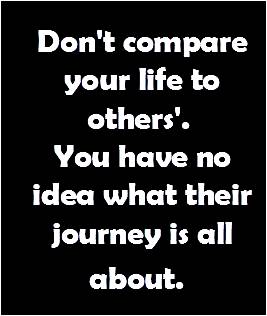
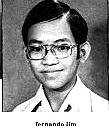


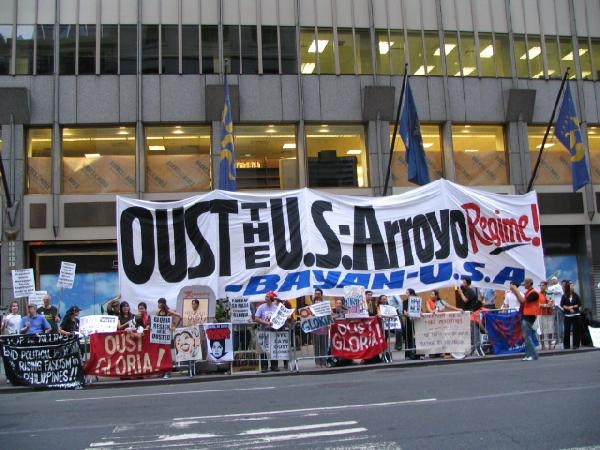


P N B employee
1989 - 2001
obielim23@gmail.com
==
Just give it a thought
Just give it a thought
| Written by Outside the Box / John Mangun |
| Monday, 02 February 2009 20:24 |
Disappointed and discouraged are the only ways to describe my reaction to those Filipinos who continue to bash the Philippines. The release of the nation's 2008 economic numbers (ahead of the time I thought they would be) could have been a moment of just a little amount of Filipino pride. When you look at countries like Spain, Singapore, Japan and others that saw their economies shrink in 2008, the Philippines did not do badly, all things considered. Instead, we got comments like this: "The supposed growth in the economy in recent years should be taken with a grain of salt." The millions of Filipino individuals and Filipino-owned businesses who made that 4.6-percent gross domestic product (GDP) growth happen clearly showed that, not only "The Filipino Can" but "The Filipino Did." To every Filipino worker and every Filipino business owner who worked harder and never gave up—unlike that man in Los Angeles who recently killed himself, his wife and his four children after losing his job—stand tall and be proud. We survived and even prospered a little through times of P50-a-kilo rice and P60-a-liter gasoline. Perhaps having the words "Economist" and "UP" on your resume means that you make so much money, anything less than a new Mercedes every year means the country is in a recession. As another example of how clueless economists can be about the Philippines, Simon Wong, an economist at Standard Chartered Bank said, "I think most of the growth came from government spending." While another "expert" Nicholas Bibby, an economist at Barclays Capital was quoted, "My suspicion is the upside surprise probably came from private consumption [spending]." Keep doing your analysis gentlemen. Even a broken clock tells the right time twice a day. I can remember when the foreign press used to describe the Philippines as "a basket case," and "the sick man of Asia," not with comments like "Overall, the Philippines will be better insulated from the collapse of external demand compared with other Asian economies." Why is there so little pride in the positive economic developments and accomplishments that the Philippines has made since the Edsa revolution? I believe it is the result of the pervasive "colonial mentality" after Edsa. The nation had come out of a black and stagnant economic prison. The Philippines sat at the feet of Western experts, like children looking for answers. We embraced with enthusiasm most of their advice. We were told to "globalize" and we did. And then we saw our export products barred entry to other "free" markets. Our agricultural products were deemed unfit for Australia and Japan. Yet Mexico shipped their mangoes to the US, stealing Filipino heritage by calling them "Manila Mangoes" because no one would buy "Mexican Mangoes." Treated like the black sheep of the world economy, the Philippines was told and even warned that the only road to prosperity was to rely on exports for economic growth. Yet today, large and small economies that believed that theory are suffering the most during this global economic contraction. Overseas Filipinos were scorned and insulted for being just domestic helpers. Now the world's shipping industry would stop and the West's hospitals would close if not for Filipino workers. Not too long ago, a Filipina in Japan was obviously a prostitute. Now Japan begs for our nurses and caregivers, needing 500,000 by 2016. Seven years ago, most Western companies laughed at the idea of outsourcing to the Philippines. Now, the Philippines and India, with a population 10 times as large, controls 50 percent of the world's outsourcing business. And our growth rate is double that of India's. The Philippines always hits high on the list of "corrupt countries" and the local press seems to delight in that fact, never saying that perhaps that sort of evaluation might be exaggerated in this sense: name a single major Filipino company, public or private, that ever put a nonexistent billion dollars on its balance sheet as India's Satyam Computer was recently discovered doing. Where is the example of a Filipino Enron, Lehman Brothers or AIG? Filipino banks were once heavily criticized for being much too small and undercapitalized. Again, where are the Philippine bank failures, except for a few, possibly crooked, rural banks that probably should have been closed years ago. Further, by the most important gauge of a bank's financial strength, Filipino banks are twice as strong as most of those in the West. A bank's capital adequacy ratio (CAR) measures the amount of total assets against risky assets, such as bad loans. The Filipino banks' CAR usually runs twice as high as what is required by international standards. Thus, there are no Washington Mutual or IndyMac Bank type failures in the Philippines. At the World Economic Forum in Davos, Switzerland, President Arroyo, as she does from time to time, gave a brilliant speech to an international audience. I saw her do it once at an Asian Development Bank forum, impressing global business and political leaders. In Davos, she politely reminded the West that for the last 10 years, they pursued polices that drove their economies into a black hole. Countries like the Philippines used that time to build themselves up. The President called for the West to included countries like the Philippines in all further global economic discussions so the West might learn some "helpful new ideas." I agree and using our strong points, of which you should be proud, might just help save the global economy. ///////// |
---
1939…The WIZARD of OZ
1965 The SOUND of MUSIC…............... j. andrews
1962 To KILL a MOCKINGBIRD
1968 The GOOD, The BAD & The UGLY…
.................c. eastwood
1969 BUTCH CASSIDY & the SUNDANCE KID….
1997 TITANIC….leo di caprio
1991 TERMINATOR 2….................schwarzenneger
1977 STAR WARS
1991 The SILENCE of the LAMBS….
...................................j.foster, a.hopkins
1994 The Shawshank Redemption
1993 SCHINDLER's LIST…...............… s.spielberg
1998 SAVING PRIVATE RYAN…….
....................s.spielberg wins oscar
1976 ROCKY…....................................... s. stallone
1992 RAISE the RED LANTERN
1981 RAIDERS of the LOST ARK….............. h.ford
1980 RAGING BULL…........................ m. scorsese
1975 One Flew Over the Cuckoo's Nest….
.......................... j.nicholson wins oscar
1999 The MATRIX
1975 JAWS.…....................................… s.spielberg
1990 GOODFELLAS…........................ m. scorsese
1974 The GodFather Part 2…….. a.pacino,m. brando
1972 The GodFather…………………
a.pacino, m.brando
1971 The FRENCH CONNECTION… g. hackman
1973 The EXORCIST….. l. blair
1973 ENTER the DRAGON…. b.lee, s. hung
1982 E.T. The EXTRATERRESTIAL….. s.spielberg
1988 DIE HARD….. b. willis
1982 BLADE RUNNER…. h. ford
1998 SCENT of a WOMAN…………………
a.pacino wins Oscar
1995 FORREST GUMP…………………
tom hanks wins Oscar
2000 CROUCHING TIGER, HIDDEN DRAGON….
.....chou yun fat, zhang ziyi
1939…The WIZARD of OZ
1965 The SOUND of MUSIC…............... j. andrews
1962 To KILL a MOCKINGBIRD
1968 The GOOD, The BAD & The UGLY…
.................c. eastwood
1969 BUTCH CASSIDY & the SUNDANCE KID….
1997 TITANIC….leo di caprio
1991 TERMINATOR 2….................schwarzenneger
1977 STAR WARS
1991 The SILENCE of the LAMBS….
...................................j.foster, a.hopkins
1994 The Shawshank Redemption
1993 SCHINDLER's LIST…...............… s.spielberg
1998 SAVING PRIVATE RYAN…….
....................s.spielberg wins oscar
1976 ROCKY…....................................... s. stallone
1992 RAISE the RED LANTERN
1981 RAIDERS of the LOST ARK….............. h.ford
1980 RAGING BULL…........................ m. scorsese
1975 One Flew Over the Cuckoo's Nest….
.......................... j.nicholson wins oscar
1999 The MATRIX
1975 JAWS.…....................................… s.spielberg
1990 GOODFELLAS…........................ m. scorsese
1974 The GodFather Part 2…….. a.pacino,m. brando
1972 The GodFather…………………
a.pacino, m.brando
1971 The FRENCH CONNECTION… g. hackman
1973 The EXORCIST….. l. blair
1973 ENTER the DRAGON…. b.lee, s. hung
1982 E.T. The EXTRATERRESTIAL….. s.spielberg
1988 DIE HARD….. b. willis
1982 BLADE RUNNER…. h. ford
1998 SCENT of a WOMAN…………………
a.pacino wins Oscar
1995 FORREST GUMP…………………
tom hanks wins Oscar
2000 CROUCHING TIGER, HIDDEN DRAGON….
.....chou yun fat, zhang ziyi
==========================================
==========================================
MANILA POST OFFICE.......CIRCA 1949
==========================================
Here is a wonderful list of hilarious quotes that will keep you laughing as you read each line! Taken from actual lines said by various stars and personalities on live tv during the '70s.
This will surely bring back funny memories for those of you who actually remember watching this on television. For those who were too young to have experienced these magical moments, this is one of the best comedic compilations of '70s tv booboos.
MELANIE MARQUEZ
*During an interview with Inday Badiday.
Inday Badiday: "Paano ka nag-susurvive sa mga trials mo?"
Melanie Marquez: "Alam mo ate Ludz, you know, when you are alone,
you really have to step your foot...ah , forward!"
SNOOKY
*Answering a question from the See-True Panel.
Snooky: " Ano kasi , she is, I mean she was, kasi past tense na nga pala ..."
BB. PILIPINAS PILIPINAS CIRCA '70s
Eddie Mercado: "Of the three titles at stake, which would you want to win?"
Finalist: "I want to win the Bb. Pilipinas Universe because it would be an
honor to represent the Philippines in the whole Universe!"
ALMA MORENO
*Wrapping up a conversation with guest Joey Albert during her show Rated A.
Alma: " So Joey, paki ulit muli yung concert mo sa University of Belt ."
DISCORAMA CONTESTANT
Joey : "Ano ang favorite movie mo, Tagalog o English?"
Discorama Girl contestant: "BOT !"
Vic: "So favorite mo talaga si Edgar Mortiz!"
MYRA MANIBOG
Joe Quirino: "Sharon, are you familiar with the current problems
we have in the film industry?"
Sharon: "Sorry, Tito Joe, I'm afraid not."
JQ: "What about you Myra, what can you say?"
Myra Manibog: "Naku Tito Joe, I'm afraid also!"
MISS GAY PHILIPPINES CONTESTANT #1
Joey de Leon: " How are you?"
Miss Gay Philippines contestant: " How are you too!"
MELANIE MARQUEZ MISS INTERNATIONAL 1978
Eddie Mercado: " Angie Dickinson has insured her legs for a million dollars,
would you also do the same?"
Melanie Marquez: "NO, of course no, because I am proud and contented
with my long legged."
(With this answer, she bagged the crown and eventually won the Miss International in 1978.)
ATOY CO
Joe Cantada : "So Atoy, what are your prospects now, mukhang
makakayanan kayo ng Toyota this coming semi-finals round..."
Atoy Co : "Well Joe, the ball is around!"
(Naghanap tuloy ng bola si Joe.)
ARNIE TUADLES
PBA anchor : So sino sa tingin mo Arnie ang may appeal sa iyong artista natin?
Arnie Tuadles (SLN): Si JEN siyempre!
PBA Anchor: Sinong Jen?
Arnie Tuadles: Si JEN SABURIT.
ANA MARGARITA GONZALES
*During Janice de Belen's debut on Germspesyal.
Kuya Germs: "Happy Birthday Janice. Ana, may sasabihin ka pa?"
Ana Margarita Gonzales (sister ni Kring-Kring):
"Ilan taon ka na ngayon, Janice?"
KUYA GERMS
*During Tom Babauta's guesting on
Germspesyal
Kuya Germs: "Do you love Philippines?"
Tom Babauta: "Yes Kuya Germs."
Kuya Germs: "Have you made love
to a Filipina ?"
LYDIA DE VEGA
*Interview after winning against PT Usha of India for the Century Dash in 1984 Asian Games.
Reporter: "What happened Lydia, mukhang bumanat ka sa ending."
Lydia: "Oo nga, mabilis siya, but you know, I ran and I fast!"
MADAM AURING
*During See True's New Year's presentation.
Ate Luds: "O sige ano na ang inyong prediction para kay Stella Strada."
Madam Auring: "Lalo siyang sisikat sa darating na taon at malalampasan
niya ang kasikatan ni Alma Moreno!"
(The next day, the headlines read: Stella Strada Commits Suicide!)
MISS GAY PHILIPPINES CONTESTANT #2
Joey de Leon: "Ano sa tingin mo ang katangian mo na iba sa mga kalaban mo?"
Miss Gay Philippines Contestant: "Unang-una, isa akong tunay na babaeng Pilipina na handang maglingkod sa bayan. Alam ko na ang isang gay na katulad ko ay maaring maging halimbawa sa lipunan. Oo nga kami'y pinagtatawanan subalit may karapatan din naman kaming mabuhay para hindi lamang sa sarili kundi para sa mga taong aming mapaglilingkuran."
Joey: "So Ano nga ang katangian iba sa iyo?"
Contestant: "Palangiti ako."
Vic: "Kahit walang tao?"
COCA NICOLAS
Isang panelist sa See True: "Paano mo nabibigyan buhay ang pag-bobold?"
Coca Nicolas: "Pinaiinum ako ni Tito Rey ng FONDADOR."
MISS GAY PHILIPPINES CONTESTANT #2
Joey de Leon: "Ano ang masasabi mo sa katayuan ng mga katulad mo
sa lipunan, sabi nila...blah, blah, blah..."
Miss Gay Phil Contestant: (panay ang ngiti at halatang kinakabahan...)
"Unang una Joey at Vic, Magandang tanghali sa inyong lahat.
Pwedeng pakiulit yung tanong?"
SUPER SI REYNA CONTEST
Emcee: "Anong masasabi mo sa death penalty?"
Contestant: A: "Ano po yun toot por toot, eye por eye."
Emcee: "Paki eksplika nga?"
Contestant: "Ganito po yun: kung pinatay mo ang nanay ko, dapat,
patayin ko din ang nanay mo!"
LITTLE MISS PHILIPPINES CONTEST #1
Emcee: "Anong gusto mong maging paglaki mo?"
Contestant: "Maging lalaki po."
LITTLE MISS PHILIPPINES CONTEST #2
Emcee (to boy consort, inaalaska): "Okay 'tong suot mo boy, a!"
Boy consort: "T&~G #NA MO!"
MR. WORLD PHILIPPINES CONTEST
Emcee: "What do you think should a man possess to be successful?"
Contestant: "I think, that for a man to be successful, he should be a responsible,
because if he should not be a responsible, he will not have a
successful. That is all. I thank you."
==========================================
MANILA POST OFFICE.......CIRCA 1949
==========================================
Here is a wonderful list of hilarious quotes that will keep you laughing as you read each line! Taken from actual lines said by various stars and personalities on live tv during the '70s.
This will surely bring back funny memories for those of you who actually remember watching this on television. For those who were too young to have experienced these magical moments, this is one of the best comedic compilations of '70s tv booboos.
MELANIE MARQUEZ
*During an interview with Inday Badiday.
Inday Badiday: "Paano ka nag-susurvive sa mga trials mo?"
Melanie Marquez: "Alam mo ate Ludz, you know, when you are alone,
you really have to step your foot...ah , forward!"
SNOOKY
*Answering a question from the See-True Panel.
Snooky: " Ano kasi , she is, I mean she was, kasi past tense na nga pala ..."
BB. PILIPINAS PILIPINAS CIRCA '70s
Eddie Mercado: "Of the three titles at stake, which would you want to win?"
Finalist: "I want to win the Bb. Pilipinas Universe because it would be an
honor to represent the Philippines in the whole Universe!"
ALMA MORENO
*Wrapping up a conversation with guest Joey Albert during her show Rated A.
Alma: " So Joey, paki ulit muli yung concert mo sa University of Belt ."
DISCORAMA CONTESTANT
Joey : "Ano ang favorite movie mo, Tagalog o English?"
Discorama Girl contestant: "BOT !"
Vic: "So favorite mo talaga si Edgar Mortiz!"
MYRA MANIBOG
Joe Quirino: "Sharon, are you familiar with the current problems
we have in the film industry?"
Sharon: "Sorry, Tito Joe, I'm afraid not."
JQ: "What about you Myra, what can you say?"
Myra Manibog: "Naku Tito Joe, I'm afraid also!"
MISS GAY PHILIPPINES CONTESTANT #1
Joey de Leon: " How are you?"
Miss Gay Philippines contestant: " How are you too!"
MELANIE MARQUEZ MISS INTERNATIONAL 1978
Eddie Mercado: " Angie Dickinson has insured her legs for a million dollars,
would you also do the same?"
Melanie Marquez: "NO, of course no, because I am proud and contented
with my long legged."
(With this answer, she bagged the crown and eventually won the Miss International in 1978.)
ATOY CO
Joe Cantada : "So Atoy, what are your prospects now, mukhang
makakayanan kayo ng Toyota this coming semi-finals round..."
Atoy Co : "Well Joe, the ball is around!"
(Naghanap tuloy ng bola si Joe.)
ARNIE TUADLES
PBA anchor : So sino sa tingin mo Arnie ang may appeal sa iyong artista natin?
Arnie Tuadles (SLN): Si JEN siyempre!
PBA Anchor: Sinong Jen?
Arnie Tuadles: Si JEN SABURIT.
ANA MARGARITA GONZALES
*During Janice de Belen's debut on Germspesyal.
Kuya Germs: "Happy Birthday Janice. Ana, may sasabihin ka pa?"
Ana Margarita Gonzales (sister ni Kring-Kring):
"Ilan taon ka na ngayon, Janice?"
KUYA GERMS
*During Tom Babauta's guesting on
Germspesyal
Kuya Germs: "Do you love Philippines?"
Tom Babauta: "Yes Kuya Germs."
Kuya Germs: "Have you made love
to a Filipina ?"
LYDIA DE VEGA
*Interview after winning against PT Usha of India for the Century Dash in 1984 Asian Games.
Reporter: "What happened Lydia, mukhang bumanat ka sa ending."
Lydia: "Oo nga, mabilis siya, but you know, I ran and I fast!"
MADAM AURING
*During See True's New Year's presentation.
Ate Luds: "O sige ano na ang inyong prediction para kay Stella Strada."
Madam Auring: "Lalo siyang sisikat sa darating na taon at malalampasan
niya ang kasikatan ni Alma Moreno!"
(The next day, the headlines read: Stella Strada Commits Suicide!)
MISS GAY PHILIPPINES CONTESTANT #2
Joey de Leon: "Ano sa tingin mo ang katangian mo na iba sa mga kalaban mo?"
Miss Gay Philippines Contestant: "Unang-una, isa akong tunay na babaeng Pilipina na handang maglingkod sa bayan. Alam ko na ang isang gay na katulad ko ay maaring maging halimbawa sa lipunan. Oo nga kami'y pinagtatawanan subalit may karapatan din naman kaming mabuhay para hindi lamang sa sarili kundi para sa mga taong aming mapaglilingkuran."
Joey: "So Ano nga ang katangian iba sa iyo?"
Contestant: "Palangiti ako."
Vic: "Kahit walang tao?"
COCA NICOLAS
Isang panelist sa See True: "Paano mo nabibigyan buhay ang pag-bobold?"
Coca Nicolas: "Pinaiinum ako ni Tito Rey ng FONDADOR."
MISS GAY PHILIPPINES CONTESTANT #2
Joey de Leon: "Ano ang masasabi mo sa katayuan ng mga katulad mo
sa lipunan, sabi nila...blah, blah, blah..."
Miss Gay Phil Contestant: (panay ang ngiti at halatang kinakabahan...)
"Unang una Joey at Vic, Magandang tanghali sa inyong lahat.
Pwedeng pakiulit yung tanong?"
SUPER SI REYNA CONTEST
Emcee: "Anong masasabi mo sa death penalty?"
Contestant: A: "Ano po yun toot por toot, eye por eye."
Emcee: "Paki eksplika nga?"
Contestant: "Ganito po yun: kung pinatay mo ang nanay ko, dapat,
patayin ko din ang nanay mo!"
LITTLE MISS PHILIPPINES CONTEST #1
Emcee: "Anong gusto mong maging paglaki mo?"
Contestant: "Maging lalaki po."
LITTLE MISS PHILIPPINES CONTEST #2
Emcee (to boy consort, inaalaska): "Okay 'tong suot mo boy, a!"
Boy consort: "T&~G #NA MO!"
MR. WORLD PHILIPPINES CONTEST
Emcee: "What do you think should a man possess to be successful?"
Contestant: "I think, that for a man to be successful, he should be a responsible,
because if he should not be a responsible, he will not have a
successful. That is all. I thank you."
| . |
The parable of the lost son
The parable of the lost son
March 13, 2009
JESUS said, "A man had two sons, and the younger son said to his father, "Father, give me the share of your estate that should come to me.' So the father divided the property between them. After a few days, the younger son collected all his belongings and set off to a distant country where he squandered his inheritance on a life of dissipation. When he had freely spent everything, a severe famine struck that country, and he found himself in dire need. ... Coming to his senses he thought, "How many of my father's hired workers have more than enough food to eat, but here am I, dying from hunger. I shall get up and go to my father and I shall say to him, "Father, I have sinned against heaven and against you. I no longer deserve to be called your son; treat me as you would treat one of your hired workers."' So he got up and went back to his father. While he was still a long way off, his father caught sight of him, and was filled with compassion. He ran to his son, embraced him and kissed him. His son said to him, "Father, I have sinned against heaven and against you; I no longer deserve to be called your son.' But his father ordered his servants, "Quickly bring the finest robe and put it on him; put a ring on his finger and sandals on his feet. Take the fattened calf and slaughter it. Then let us celebrate with a feast, because this son of mine was dead, and has come to life again; he was lost, and has been found.' Then the celebration began. Now the older son… became angry, and when he refused to enter the house, his father came out and pleaded with him. He said to his father in reply, "Look, all these years I served you and not once did I disobey your orders; yet you never gave me even a young goat to feast on with my friends. But when your son returns who swallowed up your property with prostitutes, for him you slaughter the fattened calf.' He said to him, "My son, you are here with me always; everything I have is yours. But now we must celebrate and rejoice, because your brother was dead and has come to life again; he was lost and has been found.' "
"People are our wealth. They are more important than institutions."
Raul Roco
AKA Raul Sagarbarria Roco
The GREATEST PRESIDENT WE NEVER HAD
· DATE OF BIRTH
October 26, 1941
YEAR OF DEATH
August 5, 2005·
----------------------------------------------------------------------------------------------------------------
With Raul Roco's death from prostate cancer at the age of 63, Philippine politics has lost perhaps its only intellectual heavyweight of recent years. Like many successful politicians, Raul Roco began his career in the law, serving for a long time with the ACCRA law firm, closely linked to former dictator Ferdinand Marcos. As a senator in the 1990s, he used his corporate law expertise to draft and then skillfully pilot the banking legislation that was designed to provide a springboard for the Philippines to take its rightful place among the Asian tigers (ah, those were the days). He also played a prominent role in the Estrada impeachment hearings where his clear mind, knowledge and quiet demeanor earned him deference from his senatorial colleagues.
He is a huge loss.

============================================..
Aquino, Benigno, Jr. ,November 27, 1932 -August 21, 1983
"The Youngest Senator of the Philippines"
Aguinaldo, Emilio Famy ,March 22, 1869-February 6, 1964
"The Greatest Filipino General";
Campomanes, Florencio
"Godfather and Father of Chess in the Philippines"
Maceda, Ernesto March 26, 1935
Mr. Expose
Ople, Blas
Father of Overseas Employment
Pacquiao, Emmanuel Dapigran (born December 17, 1978—
Pac Man; Little Tyson
Pimentel, Jr., Aquilino "Nene" Q. Fearless Parliamentarian
Fightingest Mayor ; Stalwart of Democracy
Father ofPhilippine Local Autonomy
Quezon, Manuel Luis, November 15, 1935-August 1, 1944
Father of Philippine Independence
Ramos, Fidel V.
First Protestant Philippine President
Recto, Claro M.
Father of the Philippine Constitution
Rizal, Jose P June 19, 1861-December 30, 1896
The First Filipino
Greatest National Hero of the Philippines
Father of Philippine Nationalism
Father of Modern Tagalog Orthography
Romulo, Carlos Peña January 14, 1899
Mr. United Nations
Salonga, Jovito
The Nation's Fiscalizer
Tolentino, Arturo,
September 19, 1910-
August 2, 2004—
Father of the Philippine
Archipelago Doctrine
Aquino, Benigno, Jr. ,November 27, 1932 -August 21, 1983
"The Youngest Senator of the Philippines"
Aguinaldo, Emilio Famy ,March 22, 1869-February 6, 1964
"The Greatest Filipino General";
Campomanes, Florencio
"Godfather and Father of Chess in the Philippines"
Maceda, Ernesto March 26, 1935
Mr. Expose
Ople, Blas
Father of Overseas Employment
Pacquiao, Emmanuel Dapigran (born December 17, 1978—
Pac Man; Little Tyson
Pimentel, Jr., Aquilino "Nene" Q. Fearless Parliamentarian
Fightingest Mayor ; Stalwart of Democracy
Father ofPhilippine Local Autonomy
Quezon, Manuel Luis, November 15, 1935-August 1, 1944
Father of Philippine Independence
Ramos, Fidel V.
First Protestant Philippine President
Recto, Claro M.
Father of the Philippine Constitution
Rizal, Jose P June 19, 1861-December 30, 1896
The First Filipino
Greatest National Hero of the Philippines
Father of Philippine Nationalism
Father of Modern Tagalog Orthography
Romulo, Carlos Peña January 14, 1899
Mr. United Nations
Salonga, Jovito
The Nation's Fiscalizer
Tolentino, Arturo,
September 19, 1910-
August 2, 2004—
Father of the Philippine
Archipelago Doctrine
===
JFK
JFK
SENATOR DIOKNO
JOSE WRIGHT DIOKNO (1922-1987) was a nationalist, human rights advocate, lawyer, Secretary of Justice, and Senator. Nicknamed Pepe, he was born on February 26, 1922 in Manila — to lawyer and Supreme Court Justice Ramon M. Diokno and Leonor Wright, an American who became a Filipino citizen.
A supreme advocate of human rights, Ka Pepe was detained in 1972 — without charges — by the Marcos dictatorship. After his release in 1974, he founded the Free Legal Assistance Group (FLAG), an association of lawyers from all over the Philippines, who render their services — free of charge — to promote the rule of law and respect for human rights in society.
Prior to his detention, Ka Pepe served nine years as a Philippine Senator, and passed many economic reform laws with the Filipino masses in mind. From 1967-1970, he was named Most Outstanding Senator by the Philippine Free Press — the only senator to be so honored for four consecutive years.
JOSE WRIGHT DIOKNO (1922-1987) was a nationalist, human rights advocate, lawyer, Secretary of Justice, and Senator. Nicknamed Pepe, he was born on February 26, 1922 in Manila — to lawyer and Supreme Court Justice Ramon M. Diokno and Leonor Wright, an American who became a Filipino citizen.
A supreme advocate of human rights, Ka Pepe was detained in 1972 — without charges — by the Marcos dictatorship. After his release in 1974, he founded the Free Legal Assistance Group (FLAG), an association of lawyers from all over the Philippines, who render their services — free of charge — to promote the rule of law and respect for human rights in society.
Prior to his detention, Ka Pepe served nine years as a Philippine Senator, and passed many economic reform laws with the Filipino masses in mind. From 1967-1970, he was named Most Outstanding Senator by the Philippine Free Press — the only senator to be so honored for four consecutive years.
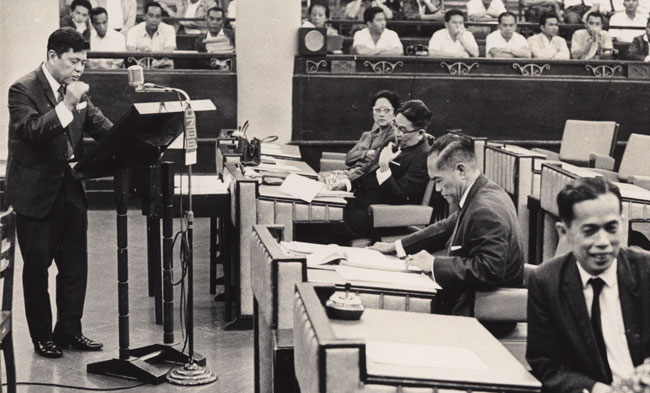
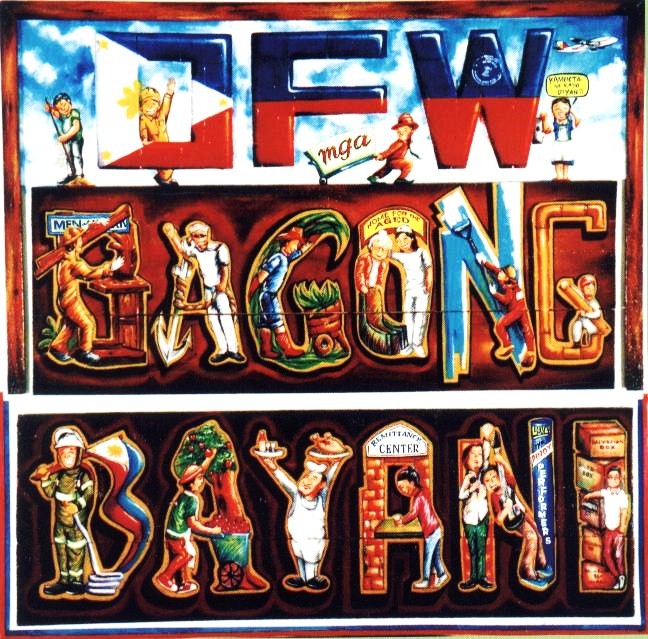
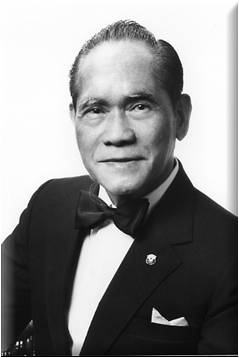

LAW and ORDER

TRUE or FALSE
11. Guys go crazy when girls touch their hands.
12. Guys seek for advice not from a guy but from a girl.
13. Guys like femininity not feebleness.
14. When a guy really likes you,
he will disregard all your bad characteristics.
15. When you touch a guy's heart, there's no turning back.
16. Guys love girls with brains more than girls in miniskirts.
17. When a guy says he is going crazy about the girl. He really is.
18. If a guy starts to talk seriously, listen to him.
19. You can truly say that a guy has good intentions
if you see him praying sometimes.
20. Guys don't actually look after good-looking girls.
They prefer neat and presentable girls.
21. Guys love their moms.
22. Guys like clean, simple clothes.
23. Guys read only sports in the newspaper.
24. Guys are contented with only one cellphone.
25. Guys are not interested in gossip, rumor, hearsay.
26. Guys hate gays, faggots , homosexuals, transvestites.

===



SENATE PRESIDENTS
Manuel L. Quezon
(1916-1935)
Manuel A. Roxas
(1945-1946)
Jose D. Avelino
(1946-1949)
Mariano Jesus L. Cuenco
(1949-1951)
Quintin B. Paredes
(1952)
Camilo O. Osias
(1952 & 1953)
Eulogio A. Rodriguez, Sr.
(1952-1963)
Jose C. Zulueta
(1953)
Ferdinand E. Marcos
(1963-1965)
Arturo M. Tolentino
(1966-1967)
Gil J. Puyat
(1967-1972)
Jovito R. Salonga
(1987-1991)
Neptali A. Gonzales
(1992-93, 95-96, 98)
Edgardo J. Angara
(1993-1995)
Ernesto M. Maceda
(1996-1998)
Marcelo B. Fernan
(1998-1999)
Blas F. Ople
(1999-2000)
Aquilino Q.Pimentel, Jr.
(2000-2001)
Franklin M. Drilon
(2000, 2001-2006)
Manny Villar
Manuel L. Quezon
(1916-1935)
Manuel A. Roxas
(1945-1946)
Jose D. Avelino
(1946-1949)
Mariano Jesus L. Cuenco
(1949-1951)
Quintin B. Paredes
(1952)
Camilo O. Osias
(1952 & 1953)
Eulogio A. Rodriguez, Sr.
(1952-1963)
Jose C. Zulueta
(1953)
Ferdinand E. Marcos
(1963-1965)
Arturo M. Tolentino
(1966-1967)
Gil J. Puyat
(1967-1972)
Jovito R. Salonga
(1987-1991)
Neptali A. Gonzales
(1992-93, 95-96, 98)
Edgardo J. Angara
(1993-1995)
Ernesto M. Maceda
(1996-1998)
Marcelo B. Fernan
(1998-1999)
Blas F. Ople
(1999-2000)
Aquilino Q.Pimentel, Jr.
(2000-2001)
Franklin M. Drilon
(2000, 2001-2006)
Manny Villar



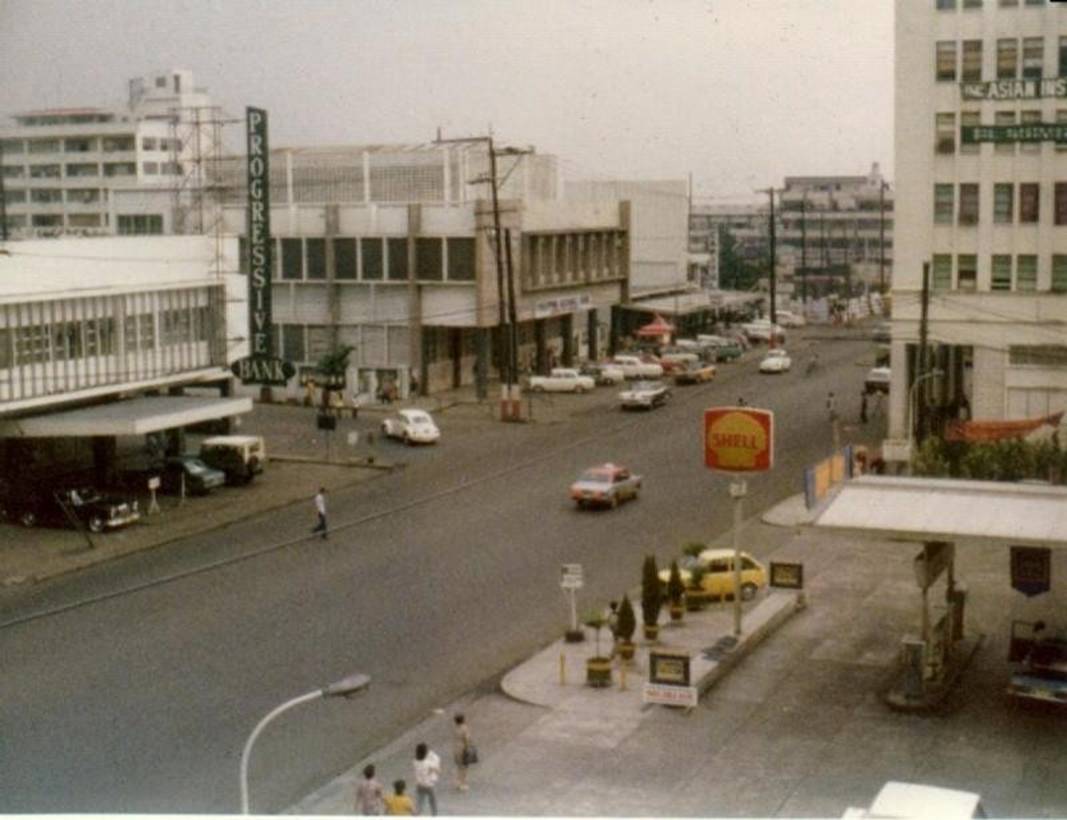


DONT LET TELEVISION
INTERFERE WITH YOUR
SENSE OF VALUES
INTERFERE WITH YOUR
SENSE OF VALUES
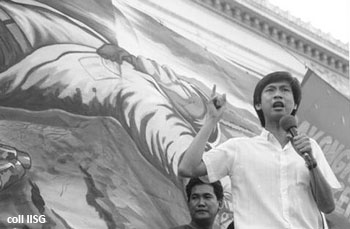

ANSWERS
11. TRUE
12. TRUE
13 TRUE
14. TRUE
15. TRUE
16. ABSTAIN
17. TRUE
18. TRUE
19. TRUE
20. TRUE
21. TRUE
22. TRUE
23. TRUE
24. TRUE
25. TRUE
26. TRUE
11. TRUE
12. TRUE
13 TRUE
14. TRUE
15. TRUE
16. ABSTAIN
17. TRUE
18. TRUE
19. TRUE
20. TRUE
21. TRUE
22. TRUE
23. TRUE
24. TRUE
25. TRUE
26. TRUE

TULAY - CROSSING
ABC, GUADALUPE
CIRCA 1964
ABC, GUADALUPE
CIRCA 1964
- - - - - - - - - - - - - - - - - - - - - - - - - - - - - -- -

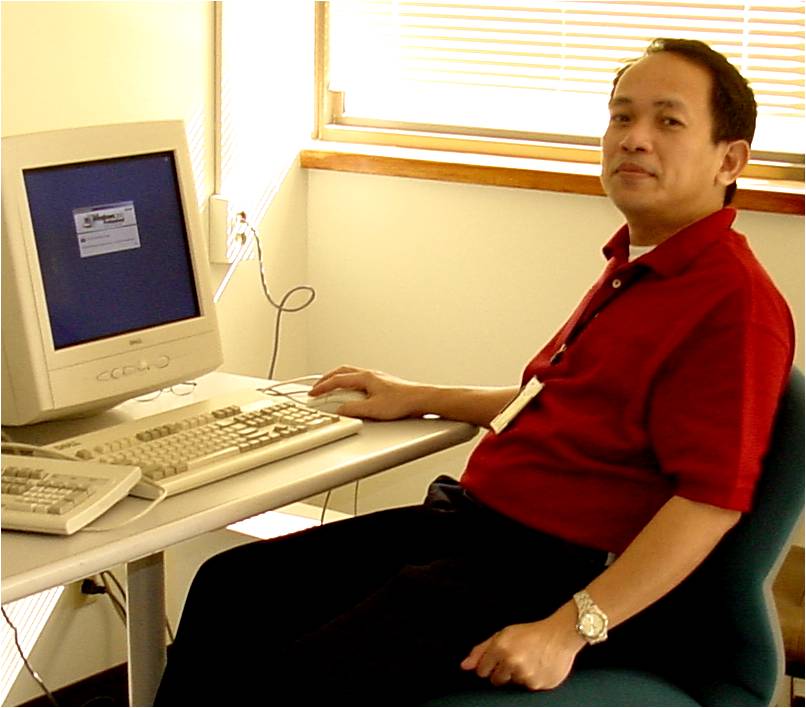
LE-AN










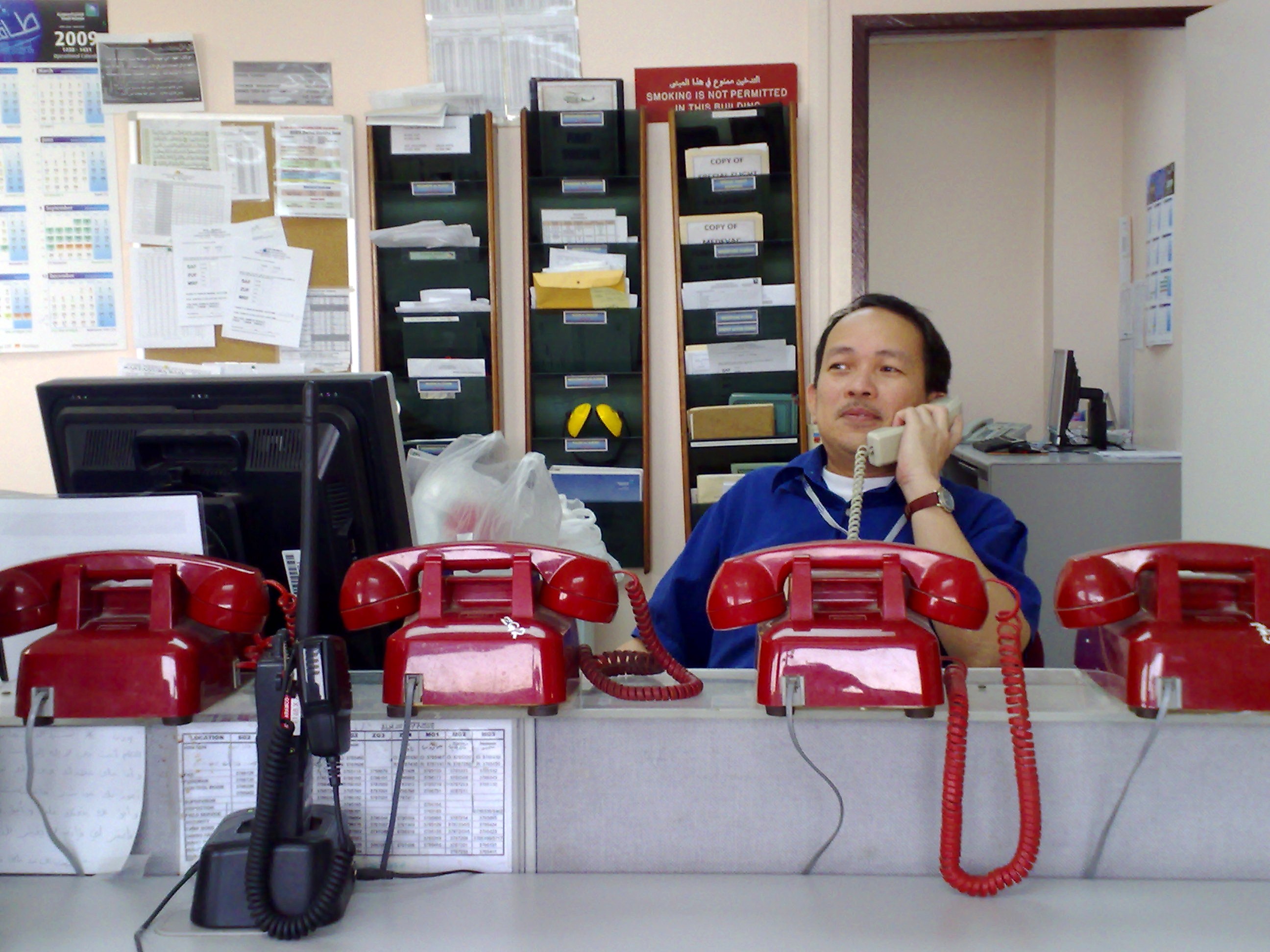
================================================================================================
The Law is unforgiving : ignorance of it is no excuse.
The Law is skeptical : hard, physical evidence,
notarized affidavits and the
testimonials of experts are
what it demands.
The Law is impatient : with many a crime there is
a statute of limitations.
================================================
The Law is unforgiving : ignorance of it is no excuse.
The Law is skeptical : hard, physical evidence,
notarized affidavits and the
testimonials of experts are
what it demands.
The Law is impatient : with many a crime there is
a statute of limitations.
================================================

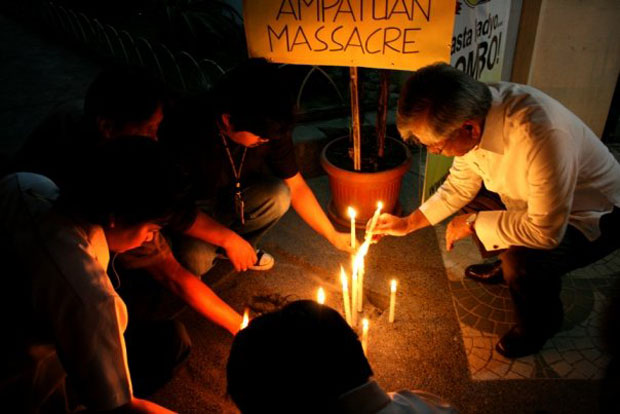
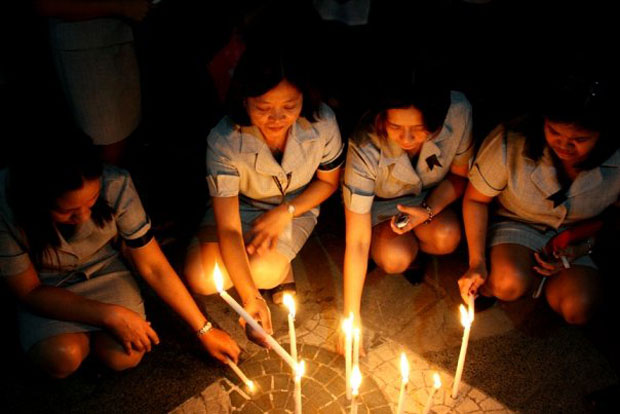

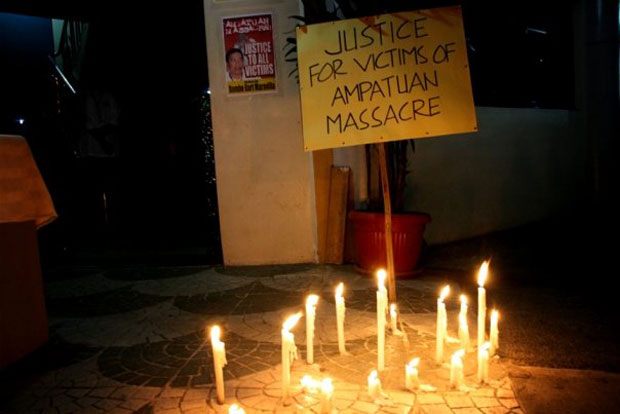








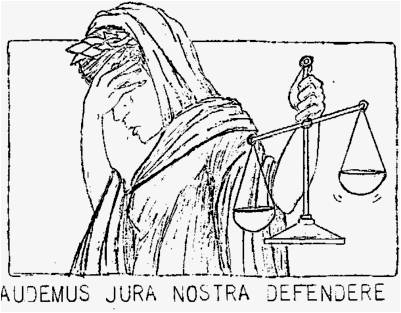

===



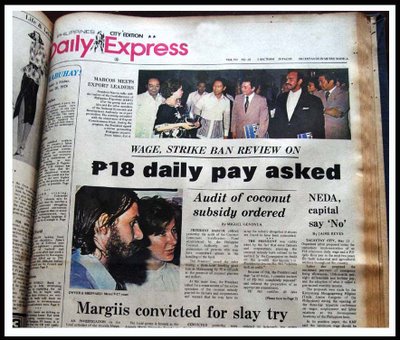










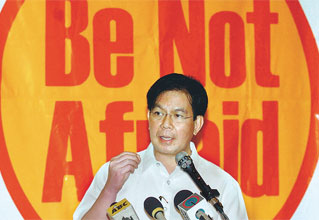
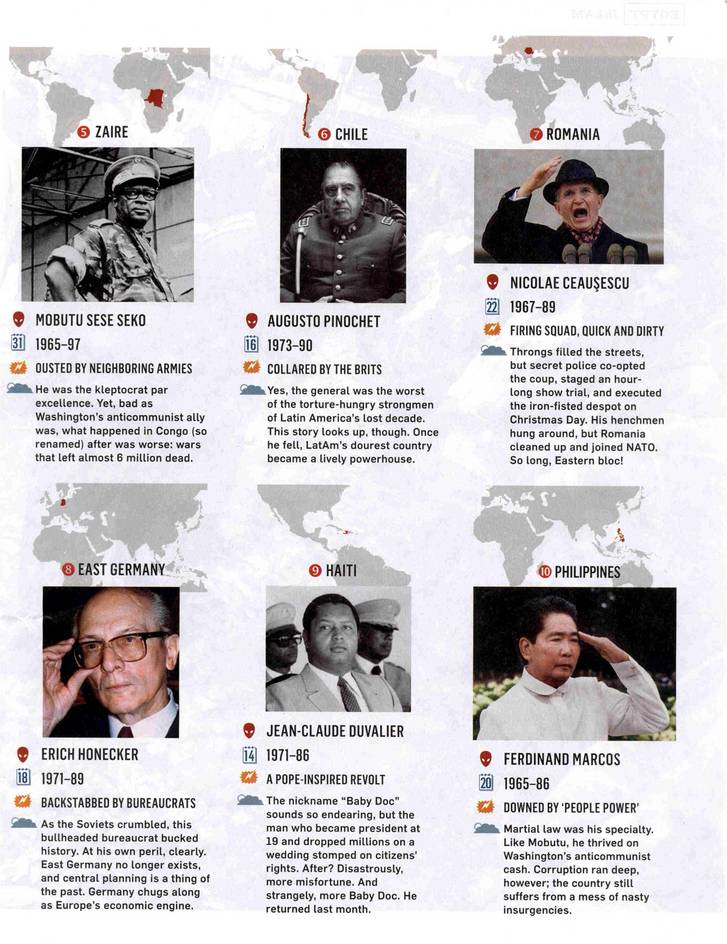
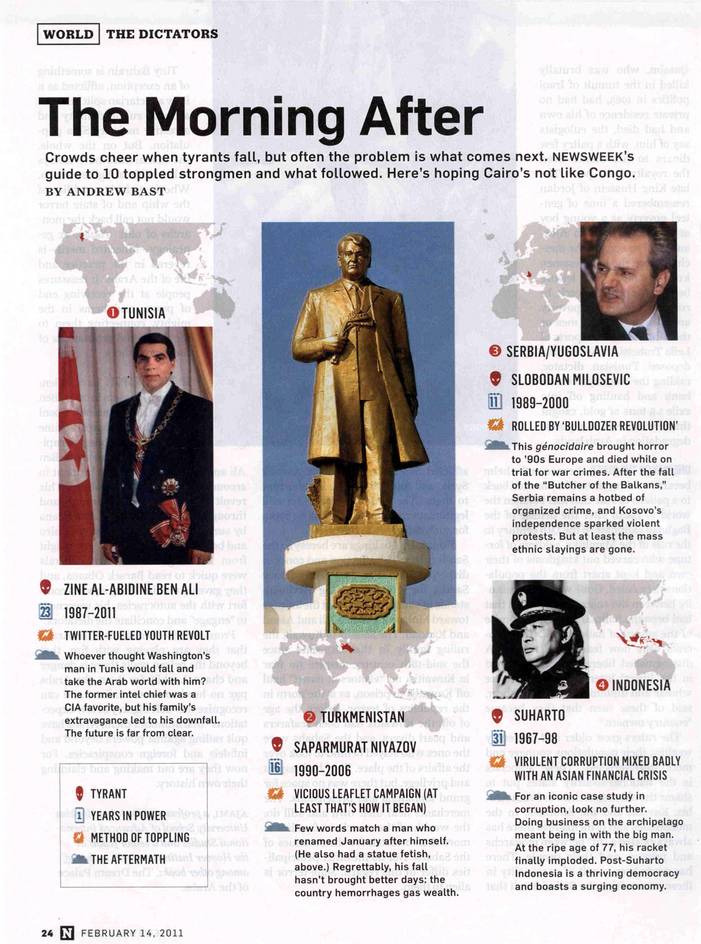

...
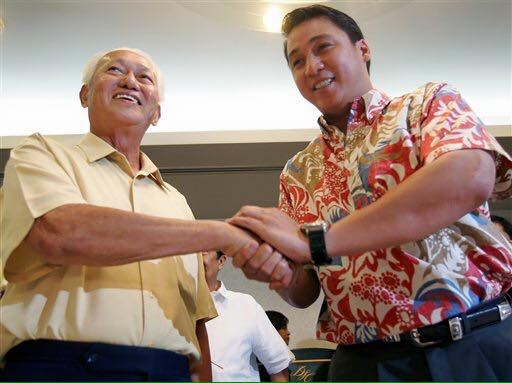


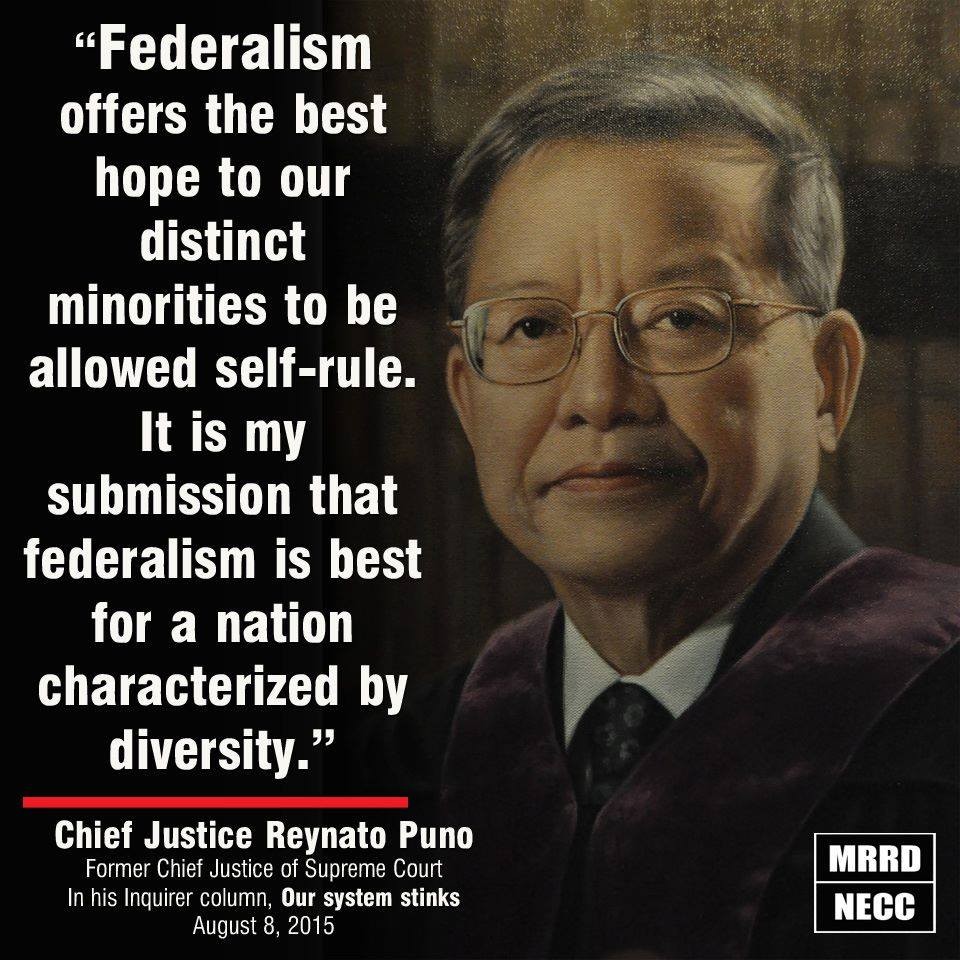
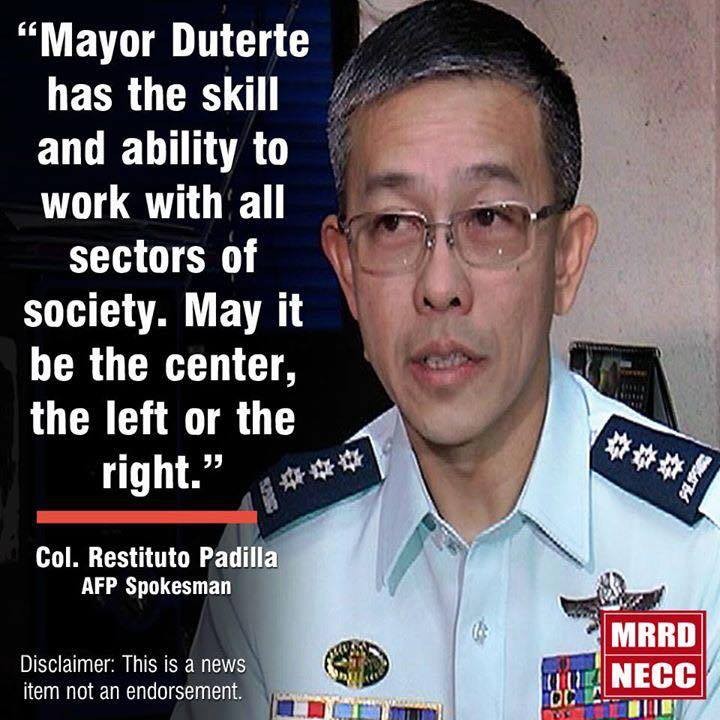
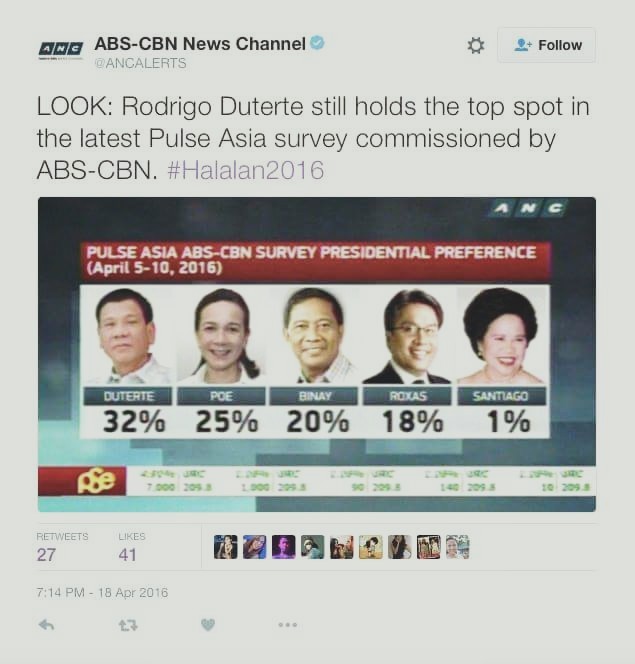






Phllip Salvador -- Tina Decena



